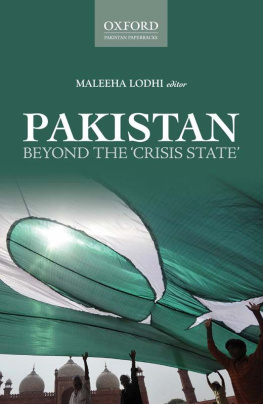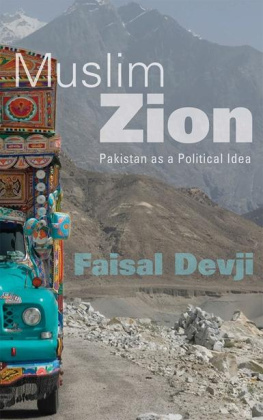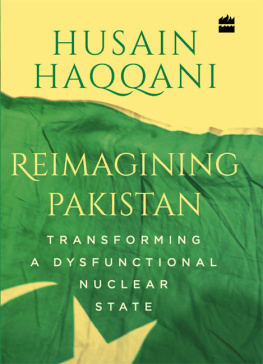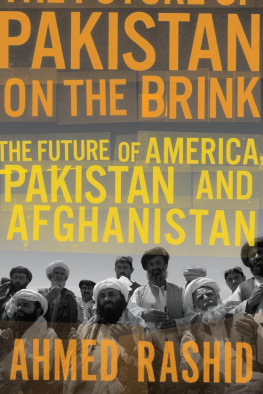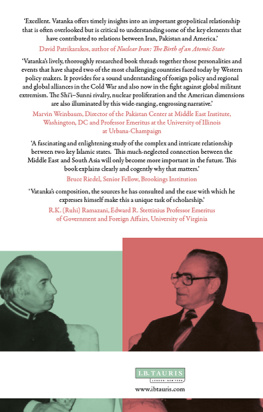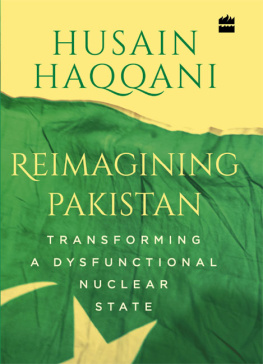Maleeha Lodhi - Pakistan Beyound the Crisis State
Here you can read online Maleeha Lodhi - Pakistan Beyound the Crisis State full text of the book (entire story) in english for free. Download pdf and epub, get meaning, cover and reviews about this ebook. year: 2011, publisher: Columbia University Press, genre: Science / Politics. Description of the work, (preface) as well as reviews are available. Best literature library LitArk.com created for fans of good reading and offers a wide selection of genres:
Romance novel
Science fiction
Adventure
Detective
Science
History
Home and family
Prose
Art
Politics
Computer
Non-fiction
Religion
Business
Children
Humor
Choose a favorite category and find really read worthwhile books. Enjoy immersion in the world of imagination, feel the emotions of the characters or learn something new for yourself, make an fascinating discovery.
- Book:Pakistan Beyound the Crisis State
- Author:
- Publisher:Columbia University Press
- Genre:
- Year:2011
- Rating:5 / 5
- Favourites:Add to favourites
- Your mark:
- 100
- 1
- 2
- 3
- 4
- 5
Pakistan Beyound the Crisis State: summary, description and annotation
We offer to read an annotation, description, summary or preface (depends on what the author of the book "Pakistan Beyound the Crisis State" wrote himself). If you haven't found the necessary information about the book — write in the comments, we will try to find it.
Pakistan Beyound the Crisis State — read online for free the complete book (whole text) full work
Below is the text of the book, divided by pages. System saving the place of the last page read, allows you to conveniently read the book "Pakistan Beyound the Crisis State" online for free, without having to search again every time where you left off. Put a bookmark, and you can go to the page where you finished reading at any time.
Font size:
Interval:
Bookmark:
Pakistan
Beyondthe'Crisis State'
BY
MALEEHA LODHI
MALEEHA LODHI
editor
Pakistan
Beyondthe'Crisis State'
OXFORD
UNIVERSITY PRESS
OXFORD
UNIVERSITY PRESS
Oxford University Press is a department of the University of Oxford.
It furthers the University's objective of excellence in research, scholarship, and education by publishing worldwide. Oxford is a registered trade mark of Oxford University Press in the UK and in certain other countries
Published in Pakistan by Ameena Saiyid, Oxford University Press
No.38, Sector 15, Korangi Industrial Area, PO Box 8214, Karachi-74900, Pakistan
Copyright Maleeha Lodhi and the Contributors, 2011. All rights reserved.
The moral rights of the author have been asserted Originally published in Great Britain in 2011 by C. Hurst & Co. (Publishers) London
First published in Pakistan by Oxford University Press in 2011 This edition in Oxford Pakistan Paperbacks 2011
For sale in Pakistan only
All rights reserved. No part of th.is publication may be reproduced, stored in
a retrieval system, or transmitted, in any form or by any means, without the prior permission in writing of Oxford University Press, or as expressly permitted by law, by licence, or under terms agreed with the appropriate reprographics rights organization. Enquiries concerning reproduction outside the scope of the above should be sent to the Rights Department, Oxford University Press, at the address above
You must not circulate this work in any other form and you must impose this same condition on any acquirer
ISBN 978-0-19-906438
Seventh Impression 2016 Printed on 68gsm Local Offset paper
Printed by The Times Press Pvt. Ltd., Karachi
Acknowledgements; Jacket Design: Fatima Jamadar
Jacket Image Pakistani flag makers display the national flag at the Badshahi Mosque, Lahore, ahead of the 62nd anniversary of title country's independence from
British rule on 14 August.
Arif Ali, AFP/Getty lmages.
ForthepeopleofPakistan,whodeserve better
Contents
From the majestic Himalayan and Karakorum mountain ranges the Indus river winds down the plains of Pakistan for nearly a thousand miles to the Arabian sea. The banks of this river have been home to one of the world's oldest and greatest civilisations. The mighty river has been the country's lifeblood, animating much of its culture and history and helping to shape a distinctly Pakistani identity.
In the summer of 2010 it was the fury of the Indus river that unleashed itself on the country with devastating consequences. Engorged by heavy monsoon rain, the river system over-flooded and deluged large swathes of Pakistan-as much as a fifth of its land area-causing large-scale destruction and displacement. Twenty million people were affected by this calamity. And this at a time when Pakistan was struggling to cope with economic and security crises and reeling from the blowback of nine years of war in neighbouring Afghanistan that started with the US led military intervention in 2001.
The floods exposed a paradox that lies at the heart of Pakistan's predicament today: that of a weak state and a strong society. As the government machinery foundered in responding to the situation, civil society, the business community, ordinary citizens and even the media, organised efforts to help the flood victims. The anaemic official response-notwithstanding the Army's effective rescue and relief efforts contrasted sharply with the heroic actions taken by private charities and local communities.
What also mitigated the tragedy was the capacity for endurance of the afflicted, who set about rebuilding their homes and lives almost as soon as the waters receded and with remarkable dignity and an unfazed resolve to overcome the challenge.
Resilience has been part of Pakistan's story from the country's inception, obscured by the single-issue lens through which outsiders have lately viewed the nation. The prism of terror and extremism has deflected attention away from the strength and stability of its underlying social structures which have enabled the country to weather national and regional storms and rebound from disasters-natural and manmade.
Many foreign observers thought when the floods struck that this was one crisis too many which would finally tip Pakistan over the edge. But the country defied this doomsday prognosis as it had earlier ones.
While Pakistan has had to navigate multiple challenges, it has always been more than an entity that lurches from crisis to crisis. Its promising potential lies in a number of attributes: an able pool of professionals and technically trained people, a hardworking labour force, a growing middle class, an enterprising business community, an energetic free media, and a lively arts, literature and music scene. Pakistan's cul tural plurality and open society are sinews of its strength. It has a sig nificant industrial base, an elaborate infrastructure of roads and communication links, a modern banking system, a large domestic market and a thriving informal economy-factors that have averted a national breakdown even when in the throes of severe financial crisis. Its economic problems are rooted in poor state management, not Pakistan's economic fundamentals, which remain robust. It has man aged-in spurts-to achieve high rates of economic growth, not nearly enough to keep pace with an exploding population, but sufficient to invest the country with several features of a modern nation.
Successive governments however have been unable to deploy these ingredients for success to unlock Pakistan's potential. Instead poor governance, rule without law and short-sighted leadership have mired the country in layers of crises that have gravely retarded Pakistan's progress and development.
It does not have to be this way. The country may yet escape its difficult first sixty-three years, resolve its problems and re-imagine its future. But doing so will need a capable leadership with the vision and determination to chart a new course.
This volume explores the path to a post-crisis state by identifying the policy responses that can bring about such an outcome. It is inspired by the belief that Pakistan's problems are soluble and its challenges can be overcome. And that Pakistanis themselves must reclaim their country by extricating it from the numerous challenges it faces.
Usually, edited books emerge from conferences. This book is the product of a 'virtual' conference-in cyberspace-that led to a meeting of minds among some of Pakistan's top practitioners and scholars, about the need to add a new dimension to the ongoing debate on 'Whither Pakistan'.
This collection offers a diversity of views and perspectives. But what binds all the distinguished contributors is their belief that Pakistan's challenges are surmountable and the impetus for change and renewal can only come from within, through bold reforms that are identified in the chapters that follow.
The issues discussed in the book cluster around the themes of governance, security, economic and human development and foreign pol icy, underlining the complex intersection of domestic and international factors that have shaped if not determined the Pakistan experience.
In the opening chapter of the volume Pakistan's leading historian, Ayesha Jalal, considers the country's current predicament in the light of a troubled past. She describes how a national paranoia has taken hold of the country, and identifies the lack of a critical historical tradition as the root of the problem. Her chapter argues that Pakistan can change course, in a strategic sense and also in terms of recasting its rational and emotional framework, if its people are allowed to delve into their history with open mindedness.
Next pageFont size:
Interval:
Bookmark:
Similar books «Pakistan Beyound the Crisis State»
Look at similar books to Pakistan Beyound the Crisis State. We have selected literature similar in name and meaning in the hope of providing readers with more options to find new, interesting, not yet read works.
Discussion, reviews of the book Pakistan Beyound the Crisis State and just readers' own opinions. Leave your comments, write what you think about the work, its meaning or the main characters. Specify what exactly you liked and what you didn't like, and why you think so.

